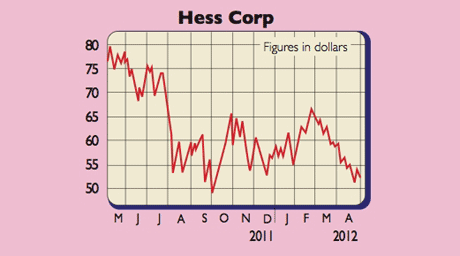Get the latest financial news, insights and expert analysis from our award-winning MoneyWeek team, to help you understand what really matters when it comes to your finances.
You are now subscribed
Your newsletter sign-up was successful
Want to add more newsletters?

Twice daily
MoneyWeek
Get the latest financial news, insights and expert analysis from our award-winning MoneyWeek team, to help you understand what really matters when it comes to your finances.

Four times a week
Look After My Bills
Sign up to our free money-saving newsletter, filled with the latest news and expert advice to help you find the best tips and deals for managing your bills. Start saving today!
Oil giant Hess is North Dakota's number one gas and number three oil producer, and owns drilling rights of 900,000 acres equivalent to more than twice the size of Greater London. These deposits are onshore, so are cheap to exploit. There is almost no risk of the assets being expropriated by government. Indeed, the chief executive, John Hess, described the acreage as "a game-changer. It is lower risk with more returns. It's great to have in your portfolio."
One small glitch is that due to environmental concerns over fracking' the authorities have been granting drilling permits at a snail's pace. The federal government is evaluating new regulations on the use of chemicals, which has meant the company will miss its target of pumping 60,000 barrels of oil equivalent per day (boed) by the end of 2012.
The good news is that this foot-dragging seems to be abating and the company still expects to double its output from 47,000 boed today over the next three to five years. The company also owns prime real estate in the Gulf of Mexico, Brazil, Ghana, Australia, Equatorial Guinea and Malaysia. Altogether these account for proven reserves of 1.6 billion boe, equivalent to about 11 years' production.
MoneyWeek
Subscribe to MoneyWeek today and get your first six magazine issues absolutely FREE

Sign up to Money Morning
Don't miss the latest investment and personal finances news, market analysis, plus money-saving tips with our free twice-daily newsletter
Don't miss the latest investment and personal finances news, market analysis, plus money-saving tips with our free twice-daily newsletter
Hess Corp (NYSE: HES), rated a BUY by Credit Agricole

The balance sheet has a debt-to-equity ratio of 26.7%, and net borrowings of $6.6bn. Wall Street is forecasting 2012 revenues and underlying earnings per share of $39bn and $6.37 respectively, rising to $40bn and $7.75 in 2013. That puts the shares on a p/e ratio of 8.5. However, I would rate the stock on an eight times EBITA multiple which, after adjusting for the debt and $1.8bn pension deficit, generates an intrinsic worth of more than $75 per share.
Investor nerves remain frayed after last year's problems in Libya, where it lost output due to the civil war, and in Norway, where a fire seriously damaged a major offshore rig. The group is also exposed to the volatile crude, gas, refining and forex markets, along with having to manage rising costs, tighter regulation and geopolitical challenges. Nonetheless, Hess must be one of the world's cheapest big oil companies. Crdit Agricole has a $90 target price.
Rating: BUY at $54
Paul Hill also writes a weekly share-tipping newsletter, Precision Guided Investments. See www.moneyweek.com/PGI or phone 020-7633 3634 for more.
Get the latest financial news, insights and expert analysis from our award-winning MoneyWeek team, to help you understand what really matters when it comes to your finances.
Paul gained a degree in electrical engineering and went on to qualify as a chartered management accountant. He has extensive corporate finance and investment experience and is a member of the Securities Institute.
Over the past 16 years Paul has held top-level financial management and M&A roles for blue-chip companies such as O2, GKN and Unilever. He is now director of his own capital investment and consultancy firm, PMH Capital Limited.
Paul is an expert at analysing companies in new, fast-growing markets, and is an extremely shrewd stock-picker.
-
 Should you buy an active ETF?
Should you buy an active ETF?ETFs are often mischaracterised as passive products, but they can be a convenient way to add active management to your portfolio
-
 Power up your pension before 5 April – easy ways to save before the tax year end
Power up your pension before 5 April – easy ways to save before the tax year endWith the end of the tax year looming, pension savers currently have a window to review and maximise what’s going into their retirement funds – we look at how